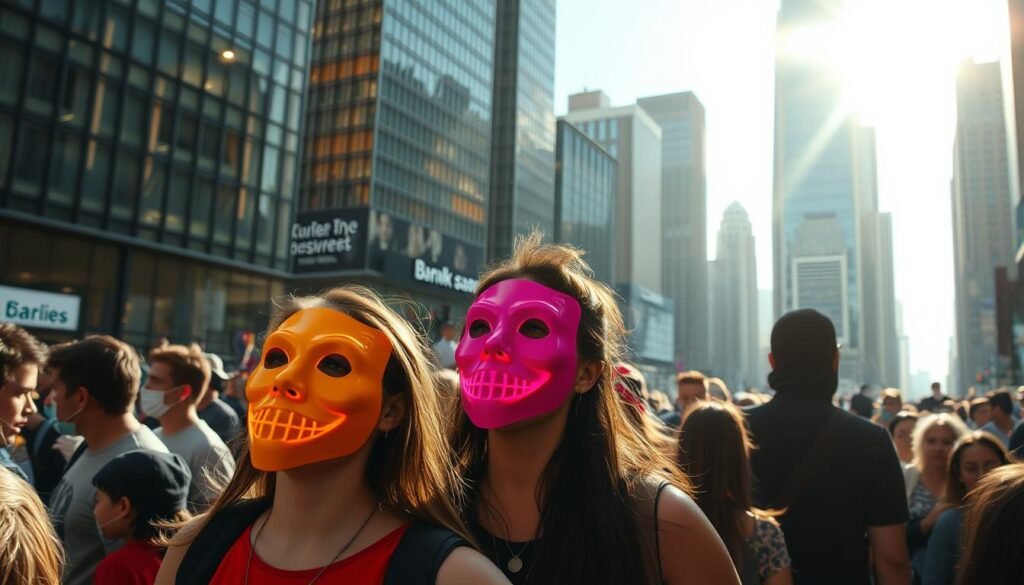About two-thirds of depression cases in the US aren’t diagnosed. This shows the unseen battle many face every day. People often hide their feelings to look okay. They try to meet what others expect, even if it’s hard.
We’ll look at how to hide depression and its effects. We’ll cover spotting the signs and why getting help matters. Our goal is to bring this important issue into the light. We’ll also talk about ways to handle mental health challenges. Plus, we’ll offer advice on supporting others who struggle.
Key Takeaways
- Hidden depression affects a significant portion of the population.
- Many coping strategies may include masking emotions.
- Undiagnosed depression can lead to more severe symptoms over time.
- The stigma surrounding mental health can complicate seeking help.
- Recognizing less obvious signs of depression is crucial for awareness.
- Support systems play a vital role in managing mental health struggles.
Understanding Hidden Depression
Smiling depression, also known as hidden depression, is hard to detect. People with it look happy to others, but inside, they struggle a lot. They can seem fine on the outside but feel deep emotional pain within. Sometimes, they don’t realize they have it because its signs are not obvious.
They might feel very tired, easily annoyed, or talk down to themselves. These signs are different from the usual sadness seen in depression. Thus, making it hard for others to notice.
What is Hidden or Smiling Depression?
People with smiling depression keep up a happy front, even though they are very sad inside. The World Health Organization says about 265 million people deal with depression globally. This includes those with smiling depression. They might not get help because they seem to be managing well, which is dangerous.
These people might sleep too much or too little. They might also eat too much or too little. Both are signs of the silent battle they fight daily.
Common Misconceptions about Depression
Many wrong ideas about depression make it hard for people to get help. Some think depression is just feeling very sad. Others think people can overcome depression if they try hard enough. Also, some believe hidden depression isn’t as serious as other types, which is false.
Such misunderstandings stop people from noticing the real problem. Signs like being irritable, pulling away from friends, or not enjoying things can be missed. Knowing the truth about hidden depression helps. It shows the importance of finding help and getting better.
How to Hide Depression
In our society, not everyone understands depression. So, many people hide their true feelings. They act normal to not show they’re struggling. They might change their daily habits to keep their feelings secret.
Techniques for Concealing Emotional Distress
Some people use specific strategies to keep their pain private. Here are a few:
- Staying alone to avoid questions.
- Looking busy with work to hide their sadness.
- Using phones to dodge talking to others.
- Changing the subject away from mental health quickly.
- Being around a small circle who understand without asking much.
These methods might offer short-term comfort. But, they don’t solve the root problem. It’s a tough act, feeling one way but showing the world another.
The Dangers of Masking Feelings of Sadness
Hiding depression has big risks. It leads some to unhealthy ways of coping. This might mean using drugs or showing anger suddenly. These choices can make someone feel more alone and empty, worsening the situation.
Research shows these facts are especially true for men, while women are more likely to ask for help. Avoiding the issue can make things worse. It’s important to face our emotions instead of hiding. This is the first step out of the cycle of sadness.
It’s critical to understand how serious hidden depression is. Society often tells us to keep our feelings in. But, admitting you need help is brave. Changing how we see mental health is key to improving it.
For more insights on the habits of those with concealed depression, visit this article.
Signs of Hidden Depression
Understanding the signs of hidden depression means looking for quiet symptoms that affect life. Many people might have these symptoms without knowing they’re important. Spotting these subtle signs can help support yourself or others dealing with hard emotions.
Less Obvious Symptoms to Watch For
Hidden depression can show itself in ways that seem like normal stress or being tired. Watch out for signs such as:
- Changes in appetite or eating habits
- Unexplained fatigue or low energy
- Loss of interest in once-enjoyed activities
- Frequent irritability or frustration
- Difficulty concentrating or making decisions
- Compulsive shopping behavior
These symptoms can create a harmful loop of emotional pain that gets worse if ignored. It’s important to recognize these signs early.
Physical Indicators of Emotional Distress
There are also physical indicators of emotional distress that come with hidden depression. They can include:
| Physical Indicator | Description |
|---|---|
| Joint or Limb Pain | Chronic pain that lacks a clear physical cause |
| Gastrointestinal Issues | Stomach pain, bloating, or changes in bowel habits |
| Fatigue | Persistent tiredness despite adequate rest |
| Changes in Sleep Patterns | Insomnia or oversleeping |
| Weight Fluctuations | Significant weight loss or gain without trying |
These signs remind us that hidden depression can affect both the mind and the body. By being aware of the signs of hidden depression, people can get the right support and understand this complex issue better.
Coping with Depression in Social Situations
Dealing with depression is hard, especially in social settings. People often skip events to avoid hiding their true feelings. They may fear others will judge them or want to protect others from their sadness. But staying away from people doesn’t really address depression.
Avoiding Social Gatherings: When and Why
Those with depression might pull away from others to guard themselves. They may stop doing things they used to enjoy. This leads to a lower quality of life. They might become irritable to push people away, making it easier to avoid talking.
Instead of facing potentially awkward talks, they choose solitude.
Managing Interactions with Friends and Family
Being open with loved ones is key. It can help lift some of the weight off your shoulders. Letting them know what you need and setting limits is vital. This way, you can still be around people without feeling overwhelmed.
Trying to keep busy might sound good, but it can wear you out, making depression worse. Taking short breaks during social times or thinking about the good parts of being with others can help.

Managing Depressive Symptoms Effectively
Managing depressive symptoms needs us to take action. This means developing daily coping strategies and doing regular self-care practices. These steps are key to feeling better emotionally and becoming stronger.
Creating Daily Coping Strategies
Setting up good daily coping methods is key for those with depression. Some strategies include:
- Setting realistic goals gives you a feeling of success.
- Adding exercise to your day can lift your spirits.
- Using mindfulness helps you stay focused and less worried.
- Being social but not too much keeps you connected but not stressed.
Finding help is an important part of dealing with depression. Resources like the Mayo Clinic have lots of info on this topic.
Focusing on Self-Care Practices
Doing self-care practices every day really helps your mood. Some activities to try include:
- Eating well to help your body and mind.
- Keeping a regular sleep schedule for better rest.
- Writing in a journal to understand your feelings.
- Enjoying hobbies and relaxing to reduce stress.
By following these coping strategies and self-care habits, you can fight depression better. Knowing how important these steps are leads to a happier, healthier life.
Maintaining a Positive Facade
Many people try to keep things normal while hiding their sadness. They show a positive front to look steady inside. Fitting into what society expects makes it hard to be real. Knowing how to deal with this is key for health.
Ways to Appear Emotionally Stable
There are many ways to look stable. People often:
- Smile even when sad.
- Join social events to forget their sorrow.
- Stay away from personal talk to not bring attention.
- Use jokes or sarcasm to hide true sadness.
Smiling depression hides the real issue. Those dealing with it may do well at work or with friends, making the happiness seem real. Yet, they might feel worthless or not enough deep down.
Handling Conversations About Mental Health
Talking about mental health might scare some because they fear others will judge them. Here’s what can help:
- Change the subject when it gets too personal.
- Use broad terms when talking about mental issues.
- Talk about facts or stories on mental health to help others understand.
Though sharing personal stories can be hard, creating a space for these talks can lead to support. Accepting that it’s okay to talk about how we feel can help heal. This way, talking about mental health becomes easier and caring.

The Role of Substance Use in Depression
It’s important to understand how substance use and depression are linked. Many people facing hard times turn to alcohol or drugs. This is because they’re trying to cope with their feelings. A lot of research shows a strong link between mood problems and substance use.
Link Between Alcohol, Drugs, and Emotional State
About 32% of people with mood disorders also struggle with substance use. This number jumps to 56% for those with bipolar disorder. It’s a big concern. Alcohol, opioids, cocaine, and amphetamines can make depression worse. This is true especially if used often and then stopped. Genes also play a part as they can lead to both substance use and depression in families.
Signs of Substance Use as a Coping Mechanism
When depressed, some people may use drugs or alcohol for short-term relief. This can cause even more problems later. Common signs to watch for include:
- Using drugs or alcohol more to deal with sadness.
- Changes in how one lives because of more substance use.
- Feeling anxious or upset when not using these substances.
- Ignoring important tasks or relationships because of substance use.
The mix of depression and substance use creates a hard cycle to break. It’s key for people to understand that treating both the mind and substance use together is important for getting better.
| Substance | Common Effects | Potential for Depression |
|---|---|---|
| Alcohol | Relaxation, impairment in judgment | Can lead to more depression if used a lot |
| Opioids | Pain relief, euphoria | Stopping them can cause anxiety and depression |
| Cocaine | Euphoria, increased energy | Stopping it can result in a very low mood |
| Amphetamines | Increased concentration, euphoria | Using them a lot may cause depression |
| Cannabis | Relaxation, altered perception | Can make mood problems worse over time for some |
Seeking Support During Tough Times
Finding the right support is key when facing depression. It might feel easier to hide your feelings, but reaching out helps a lot. Talking to those you love makes you feel safe to share your struggles. Getting professional help gives you the mental health support you need.
Communicating with Loved Ones
Talking openly is crucial when you’re depressed. You might think you’re a burden, but your loved ones want to help. Sharing your feelings helps build stronger connections. Here are tips for good communication:
- Choose a comfortable place for a deep talk.
- Be open about what you’re feeling and going through.
- Encourage questions to help them understand.
- Tell them how they can support you.
Realizing you’re depressed can prompt others to offer help. Family and friends are often the first to notice. Keeping them in the loop improves your support system.
Finding Professional Help
Professional help is crucial for dealing with depression. Therapists and counselors give structured support for your needs. You can find a mental health pro in several ways:
- Use work resources for counseling services.
- Look at online directories for therapists nearby.
- Join local support groups to meet others in similar situations.
It’s important to encourage seeking help when you see warning signs like feeling hopeless or acting self-destructively. Giving love and support during their recovery makes a big difference. Depression can be treated. Taking steps to get support makes life more manageable.

The Importance of Mental Health Awareness
Mental health awareness helps create a supportive atmosphere for those with conditions like hidden or smiling depression. People often hide their struggles, pretending everything is fine. It’s key to have a space where being open about mental health is normal. Knowing more about these issues can break down many myths.
Benefits of Being Open About Mental Health Struggles
When people share their mental health experiences, it brings lots of good. It makes their own feelings seem valid and inspires others to share. Greater mental health awareness leads to a deeper understanding of challenges, including unseen depression. This openness can spark important conversations that lead to changes and support.
Reducing Stigma Surrounding Depression
The stigma around mental health prevents many from talking about it. Fear of judgement stops people from seeking the help they need. By talking openly about mental health, we can fight reducing stigma and encourage acceptance. Education and awareness programs help people find the resources they need. For info on dealing with hidden depression, this resource offers great advice.
Talking about mental health makes our communities more welcoming. Teaching those around us about depression’s realities helps them offer better support. We must build places where sharing struggles is safe, leading to improved mental health for everyone.
Conclusion
Hiding depression is hard for many people. It’s important to see the signs, which can be emotional, physical, or behavioral. People with Perfectly Hidden Depression seem to do well on the outside. But, they may feel alone and isolated if they don’t talk about their feelings.
It’s key to ask for help if you’re feeling down. Finding ways to cope can lead to feeling better emotionally. If you have symptoms of depression, know that you’re not the only one feeling this way. Talking to friends, family, or getting professional help can build a support system.
To deal with hidden depression, you need to take action. Being aware of your feelings, using coping skills, and talking about mental health can help you heal. For tips on spotting depression and getting the right support, check this support guide. It’s a helpful tool for understanding these complex matters.